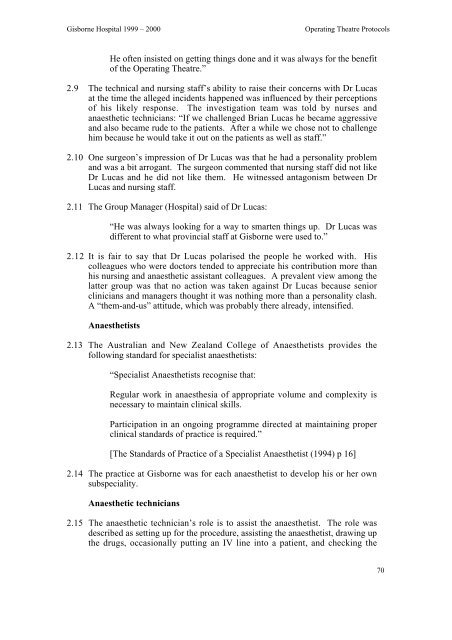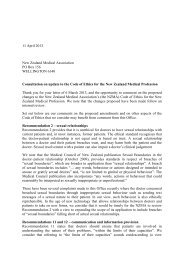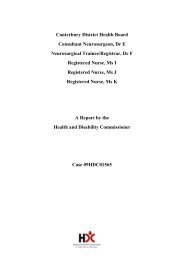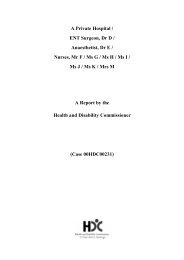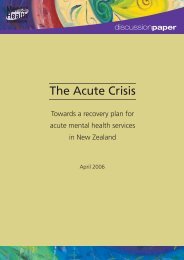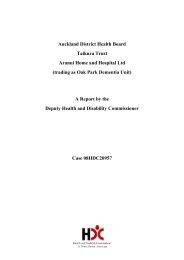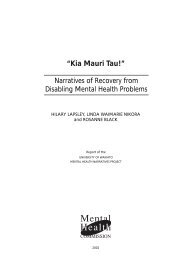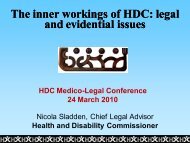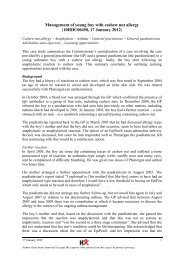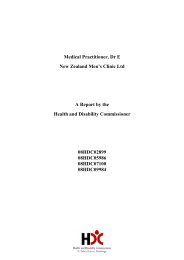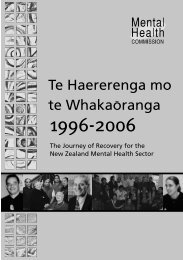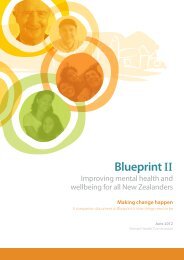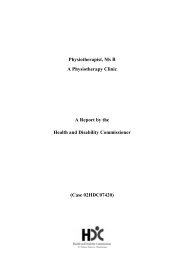Gisborne Hospital Report - Health and Disability Commissioner
Gisborne Hospital Report - Health and Disability Commissioner
Gisborne Hospital Report - Health and Disability Commissioner
You also want an ePaper? Increase the reach of your titles
YUMPU automatically turns print PDFs into web optimized ePapers that Google loves.
<strong>Gisborne</strong> <strong>Hospital</strong> 1999 – 2000<br />
Operating Theatre Protocols<br />
He often insisted on getting things done <strong>and</strong> it was always for the benefit<br />
of the Operating Theatre.”<br />
2.9 The technical <strong>and</strong> nursing staff’s ability to raise their concerns with Dr Lucas<br />
at the time the alleged incidents happened was influenced by their perceptions<br />
of his likely response. The investigation team was told by nurses <strong>and</strong><br />
anaesthetic technicians: “If we challenged Brian Lucas he became aggressive<br />
<strong>and</strong> also became rude to the patients. After a while we chose not to challenge<br />
him because he would take it out on the patients as well as staff.”<br />
2.10 One surgeon’s impression of Dr Lucas was that he had a personality problem<br />
<strong>and</strong> was a bit arrogant. The surgeon commented that nursing staff did not like<br />
Dr Lucas <strong>and</strong> he did not like them. He witnessed antagonism between Dr<br />
Lucas <strong>and</strong> nursing staff.<br />
2.11 The Group Manager (<strong>Hospital</strong>) said of Dr Lucas:<br />
“He was always looking for a way to smarten things up. Dr Lucas was<br />
different to what provincial staff at <strong>Gisborne</strong> were used to.”<br />
2.12 It is fair to say that Dr Lucas polarised the people he worked with. His<br />
colleagues who were doctors tended to appreciate his contribution more than<br />
his nursing <strong>and</strong> anaesthetic assistant colleagues. A prevalent view among the<br />
latter group was that no action was taken against Dr Lucas because senior<br />
clinicians <strong>and</strong> managers thought it was nothing more than a personality clash.<br />
A “them-<strong>and</strong>-us” attitude, which was probably there already, intensified.<br />
Anaesthetists<br />
2.13 The Australian <strong>and</strong> New Zeal<strong>and</strong> College of Anaesthetists provides the<br />
following st<strong>and</strong>ard for specialist anaesthetists:<br />
“Specialist Anaesthetists recognise that:<br />
Regular work in anaesthesia of appropriate volume <strong>and</strong> complexity is<br />
necessary to maintain clinical skills.<br />
Participation in an ongoing programme directed at maintaining proper<br />
clinical st<strong>and</strong>ards of practice is required.”<br />
[The St<strong>and</strong>ards of Practice of a Specialist Anaesthetist (1994) p 16]<br />
2.14 The practice at <strong>Gisborne</strong> was for each anaesthetist to develop his or her own<br />
subspeciality.<br />
Anaesthetic technicians<br />
2.15 The anaesthetic technician’s role is to assist the anaesthetist. The role was<br />
described as setting up for the procedure, assisting the anaesthetist, drawing up<br />
the drugs, occasionally putting an IV line into a patient, <strong>and</strong> checking the<br />
70


